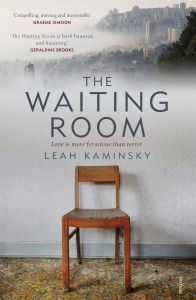Pre-Shabbat Jewish Literary Links

Shabbat shalom. PS: I’ll be traveling for the next few days; comment moderation and response will resume after my return.

Shabbat shalom. PS: I’ll be traveling for the next few days; comment moderation and response will resume after my return.
As noted on my other blog, I’m taking a brief break from blogging for the rest of 2015. See you again in the new year!
 I was all set to wait patiently for the U.S. release of Leah Kaminsky‘s debut novel The Waiting Room (which will happen next fall). But then, the author—an Australian whom I’ve yet to meet in person but with whom I’ve developed another of those wonderful “online friendships” I’m so grateful for—sent me a gift copy of the original Australian edition, which was published this past September. And how pleased I am that she did.
I was all set to wait patiently for the U.S. release of Leah Kaminsky‘s debut novel The Waiting Room (which will happen next fall). But then, the author—an Australian whom I’ve yet to meet in person but with whom I’ve developed another of those wonderful “online friendships” I’m so grateful for—sent me a gift copy of the original Australian edition, which was published this past September. And how pleased I am that she did.
There’s so much that’s noteworthy about this book, beginning with the subject matter. What I realized only a few pages in is that The Waiting Room brings together two topics that are often categorized separately among Diaspora readers. First, there’s its Holocaust thread. Protagonist Dina Ronen, Australian-born, is the daughter of two Holocaust survivors. Her father died during Dina’s childhood; her mother has passed away by the time the novel opens, with Dina a married mother of one young son and another baby about a month away from delivery. But her mother’s ghost speaks throughout the book, and we return often to her parents’ histories in flashbacks. (more…)

Shabbat shalom.
“I read web and social media and it’s shocking how liberal Jews (I consider myself one, recall) so quick to righteously protest the sufferings of just about everyone else in the world, rarely have expressed any sorrow for the knifing of Jewish children. Sadly they seem to have been bullied by the BDS types, by the social media sewer of anti-Semitism, the Shylockization of Netanyahu. By the ‘moral equivalence’ ‘cycle of violence’ narrative. Can’t feel bad about murdered Jews if a right wing government’s in power. To the extent that if a liberal Jew speaks up for the murdered at a dinner party he is suddenly Sheldon Adelson. Or the Jew in the Annie Hall dinner scene abruptly finding himself clothed in Hasidic garb (not that there’s anything wrong with that).”
Source: Ron Rosenbaum, “Thinking the Unthinkable: A Lamentation for the State of Israel” (Tablet)